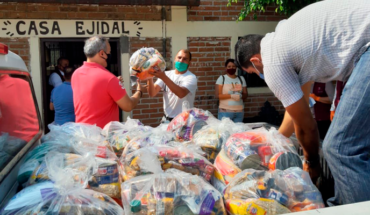The inflation data for February, revealed on Tuesday by Indec, once again set off alarm bells in the Government. The 4.7% increase in prices during the second month of the year, but especially the 7.5% of the Food and Beverage category, led the president to announce that “on Friday the war against inflation in Argentina begins.” At the moment, the official artillery would not bring great novelties. As it transpired, these are new versions of price agreements and trusts such as those that were implemented during the last months, without great results.
For the medium term, the official anti-inflationary plan is written in the Memorandum of Economic and Financial Policies signed with the International Monetary Fund (IMF). It sets targets for reducing the fiscal deficit, a consequent gradual elimination of monetary issuance by 2024 and a policy of positive real interest rates. A program that is quite close to economic orthodoxy, beyond the multicausal diagnosis of the problem. However, the greatest tensions on the price level lie in the immediate. Failure to counteract the local effects of the distortions generated by the war in Ukraine on markets risks escalating a level of inflationary inertia. The shock of the war in Ukraine
The jump in international prices of agricultural raw materials has a dual effect on the Argentine economy. On the one hand, it considerably improves the profit margins of producers and exporters in the agricultural sector, while increasing the income of dollars and the state collection through export duties. On the other hand, the new quotations of wheat, corn and soybeans are transferred to domestic food prices, accelerating inflation.
Despite the bulky February data, this external shock is having full impact during March. The emblematic case is the price of bread, which accumulates a 50% increase since the beginning of last month after an increase of 25% during February and the same during the current month, after the impact of the wheat shot. Consequently, a kilo of bread sells for $300 on average. On the other hand, a study by the Rosario Stock Exchange, which considers the increase in international prices as of March 7, projects an increase in the net margin for the sowing of wheat in its own field of 25% in dollars compared to last year. Withholdings
It is in this context of increasing profit margins in the sector that the debate on withholdings is installed. An increase in the rates of export duties paid by wheat and maize translates into a fall in the domestic price of these raw materials, which will have an impact on the entire food chain. This happens because the tax works as a “discount” on the price of sale abroad: today wheat pays a 12% withholding tax for exporting, therefore in the domestic market it should sell at 88% of the international price (leaving aside the price of the dollar). An increase in the aliquot implies a greater decoupling of the quotation in the commodity markets. The logic of capitalism leads producers to seek to completely monopolize extraordinary income, and to oppose withholdings in order to maximize their profits. Therefore, faced with the rumor of the increase in the rates of export duties, the Liaison Commission of Agricultural Entities issued a statement where it warned that “There is no more room for manipulation or to continue plundering us as a sector, or subjugating us. Producers across the country will not allow or hesitate to defend our rights as we did 14 years ago, exactly on a day like today,” alluding to resolution 125.
Food prices are impossible. There is a war that screws everyone. There is, in the face of that, not the slightest accompaniment. The most benefited sectors complain while the bottom 40% survive worse and worse. — Stephen Rafele (@estebanrafele)
March 16, 2022
Thus, while the president declares a war on inflation, producers declare war on withholdings. So far, the advantage is for the second side. The war on inflation
The economic cabinet not only rejects an increase in the rates on wheat and corn due to the political weakness of the executive. Also made use of an economic argument: according to the data available, almost all of the wheat harvest available for export has already been sold. In this line, moving forward with an increase in the tax would have an almost zero collection effect. However, the yields dthe sector is measured in reference to international prices, in dollars. Although producers cannot sell their harvest abroad, that price is used to calculate domestic prices. In fact, that is why wheat and corn derivatives are skyrocketing in the domestic market. Therefore, the official argument only makes collection (and political) sense. If the ruling party does not want to lose the “war against inflation”, this tool should be implemented even if its result in the public accounts is innocuous.
Increase in international quotes. Source: Ieral, Mediterranean Foundation
In this sense, one of the measures advanced for the “war against inflation” is the increase in the rate of withholdings on soybean meal and oil, two products that have almost no impact on domestic prices. The proceeds would be used to finance a trust intended to subsidize the value of wheat derivatives to alleviate the shift to food prices. Apparently, the external shock in international quotations becomes an acquired right for local agricultural producers and exporters, since the price they receive is out of the question. In this framework, if measures to curb price increases are limited to price agreements, trusts and dialogue tables, the war is lost before it begins. But those who are losing it are not only the civil servants, but mainly the people who accumulate four years of loss of purchasing power, where the prospects of reversing their situation are increasingly clouded. While the parity guideline sets 45% for this year’s wage increases, the inflationary outlook is well above. If the war against inflation is not taken seriously and the extraordinary profits of a minority sector of the population are weighed against a certain increase in poverty, the images of downtown Buenos Aires and the main cities of the country full of demonstrators will be part of the daily landscape.
In this note:





